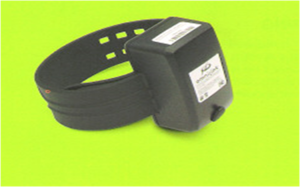Law-enforcement technologyTracking technology may make incarceration a thing of the past
The United States is facing a prison problem: there are many people in prisons — more than two million, a population the size of Houston; here is an idea: how about releasing most of them so they can lead productive lives — but make them wear something like the ExacuTrack from Anderson, Indiana-based BI Incorporated: the combination ankle bracelet and GPS transponder keeps real-time tabs on those who wear the gear, making sure they do what they are supposed to do and stay away from places where the state does not want them

Tracking devices may alleviate some prison problems // Source: rseden.org
The United States is facing a prison problem: there are many people in prisons — more than two million, a population the size of Houston — and not only is this a huge drain on public coffers, but it is also a waste of millions of man-hours by both the inmates and the people who spend their productive hours keeping an eye on them.
Graeme Wood writes in Atlantic that there is a better way. He describes a new prison paradigm that would take the economic — and, for the inmates, psychological — pressure out of the penal system. He says we should let most of the inmates go free, then use technology to monitor their every move.
Wood admits that a world in which felons are free to move about is highly reliant on technological solutions, but the benefit of taking a tremendous strain off a failed prison system would be worth it, to say nothing of the fact that thousands of decent people who have run afoul of the law — for example, for possession of illegal substances — come out of the penal system hardened, more violent, and with new friends from their time spent inside.
Wood argues that by keeping pettier criminals out of jail, we keep them working, keep them among positive influences like family — this is also good for the family — and keep them out of trouble.
Wood’s technological solution would also address the current parole/probation system, which is also a failure, with overworked officers trying to ensure that too many felons stay out of trouble.
Technological solutions like the ExacuTrack from Anderson, Indiana-based BI Incorporated can do that automatically. The combination ankle bracelet and GPS transponder (worn on the waist like a cell phone) keeps real-time tabs on those who wear the gear, making sure they do what they are supposed to do and stay away from places where the state does not want them.
For instance, a parole officer could detail a rigid routine for a felon, ensuring he adheres to his work schedule, reports for community service, and stays away from areas of the city where he got ino trouble in the first place. The tracking technology can make sure he stays clear of other felons wearing similar devices. Moreover, the gear would make sure the felon is not asked to join another crime caper: it is unlikely that he will be recruited while wearing a GPS tracker.
BI says that its technology is already capable of monitoring the free-range felon’s sweat for traces of alcohol use if necessary, and future versions could also monitor for other substances to ensure they stay off drugs or alcohol and take their prescribed medications.
BI also notes that as other wireless technologies progress, so too could the monitoring technology — for instance, checking for the felon’s proximity to the kinds of products the prisoner was in the habit of stealing before he got caught.
Wood admits that sounds intrusive, but when citizens are convicted of felonies they give up some rights. Given that the alternative is to sit in a prison cells, it is likely that many would prefer to remain on the outside as a productive, yet partially restricted, member of society.
